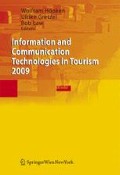Abstract
Organization of cultural events in a tourist destination often demands large investments. For this reason, authorities, tourism managers and operators need data to support their decisions, define their strategies and, in general terms, they are interested in measuring the economic impact of such events on tourism. In this paper, we propose a lightweight framework that can be applied to gather data on the places tourists visit during an event. The framework is based on an action tracking system that exploits RFID technologies on an existing city card circuit. The main choices necessary to design a system that allows to satisfy technical, organizational and budget constraints are described referring to its application to two important recent festivals — Trento FilmFestival and the Festival of Economics — characterized by very different content, history, and targets.
Preview
Unable to display preview. Download preview PDF.
References
Abe, A., Maita, N., Ooshida, Y., & Kano, T. (2007). Design Approach for Providing Tourism Information by Linking RFID and GIS Proposal for a System Based on the Universal. In G. Magyar, & G. Knapp, Advances in Information Systems Development, 247–258. Springer US.
Angeles, R. (2007). An empirical study of the anticipated consumer response to RFID product item tagging. Industrial Management & Data Systems, 107 (4), 461–483.
Chen, P., Chen, W., Wu, C., Tseng, Y.-C., & Huang, C.-F. (2007, April). A Group Tour Guide System with RFIDs and Wireless Sensor Networks. Proc. of 6th Int. Symposium on Information Processing in Sensor Networks, PSN 2007 561–562.
Costa, P., & Manente, M. (1993). The Economic Impact of Tourism in Italy: A Multiregional-Multisectoral Analysis for 1988. Venezia: CISET.
Curtin, J., Kauffman, R., & Riggins, F. (2007). Making the ‘MOST’ out of RFID technology: A research agenda for the study of the adoption, usage and impact of RFID. Information Technology and Management, 8 (2), 87–110.
Danks, M., Goodchild, M., Rodriguez-Echavarria, K., Arnold, D., & Griffiths, R. (2007). Interactive Storytelling and Gaming Environments for Museums: The Interactive Storytelling Exhibition Project. Edutainment, 104–115.
Deguchi, A., Mizoguchi, H., Inagaki, S., & Kusunoki, F. (2007) A Next-Generation Audio-Guide System for Museums “SoundSpot”: An Experimental Study. Proc. of KES 2007, LNCS, 4694, 753–760.
Dwyer, L., Forsyth, P., & Spurr, R. (2004). Evaluating tourism’s economic effects: new and old approaches. Tourism Management, 3 (25), 307–317.
Evjemo, B., Akselsen, S., & Schurmann, A. (2007). User Acceptance of Digital Tourist Guides Lessons Learnt from Two Field Studies. Proc. of HCI, Part I, HCII 2007, LNCS, 4550, 746–755.
Finkenzeller, K. (2003). RFID Handbook: Fundamentals and Applications in Contactless Smart Cards and Identification. John Wiley & Sons.
Fung L. C., Chan, K. H., Lam W. K., Leung S. W., Wong Y. F., Wu Paul W. K, and Tang C. K. (2007). Electromagnetic Assessment on Human Safety of RFID System at Hong Kong International Airport. Microwave and Optical Technology Letters, 49 (4), 924–927
Guerzoni, G. (2008). Effetto festival. L’impatto economico dei festival di approfondimento culturale. La Spezia: Fondazione Carispe.
Hall, T., & Bannon, L. (2006). Designing ubiquitous computing to enhance children’s learning in museums. Journal of Computer Assisted Learning, 22, 231–243.
Hsi, S. (2003). A study of user experiences mediated by nomadic web content in a museum. Journal of Computer Assisted Learning, 19, 308–319.
Istituto di Ricerche Economiche. (2005). Impatti economici e potenziali strategici del Festival internazionale del film Locarno. Bellinzona: Università della Svizzera Italiana.
Istituto Regionale di Ricerca della Lombardia. (2006). Metodologie di valutazione di impatto degli interventi culturali. Milano: Regione Lombardia.
Manente, M. (1999). Regional and inter-regional economic impacts of tourism consumption: methodology and the case of Italy. Tourism economics, 5 (4), 425–436.
Mathieson, A., & Wall, G. (1982). Tourism: Economic, Physical and Social Impacts. Prentice Hall.
Mugellini, E., Rubegni, E., & Khaled, O. A. (2007). Tangible Interaction based on Personal Objects for Collecting and Sharing Travel Experiences. Proc. of HCII 2007, LNCS (pp. 873–882).
Oztaysi, B., & Mich, L. (2008). Technology selection for radio frequency identification (RFID) based actions-tracking system using fuzzy analytic hierarchy process. In: D. Ruan, J. Montero, J. Lu, L. Martínez, P. D’Hondt and E.E. Kerre (eds.), Computational Intelligence in Decision and Control, vol. 1, Proc. of the 8th Int. FLINS Conference (pp. 1057–1062).
Research Resolutions & Consulting Ltd. (2005, August 01). Guidelines for Measuring Tourism Economic Impact At Gated Events and Festivals. Retrieved August 26, 2008, from Alliance for Arts and Culture: http://www.allianceforarts.com/advocacy/EconImpactGatedEvents.pdf
Research Resolutions & Consulting Ltd. (2005). Guidelines for Measuring Tourism Economic Impact At Gated Events and Festivals.
Roberts, C. (2006). Radio Frequency Identification (RFID). Computers & Security, 25 (1), 18–26.
Roussos, G. (2006). Enabling RFID in Retail. Computer, 39 (3), 25–30.
Smith, J.R., Fishkin, K.P., Jiang, B., Mamishev, A., Philipose, M., Rea, A.D., Roy, S., & Sundara-Rajan, K. (2005). RFID-Based Techniques For Human-Activity Detection. Communications of the Acm, 48 (9).
Tyrrell, T., & Johnston, R. (2006). The Economic Impacts of Tourism: A Special Issue. Journal of Travel Research, 45 (1), 3–7.
Zach, F., Gretzel, U., & Fesenmaier, D. R. (2008). Tourist Activated Networks: Implications for Dynamic Packaging Systems in Tourism. Information and Communication Technologies in Tourism 2008 (pp. 198–208). Wien: Springer.
Author information
Authors and Affiliations
Editor information
Editors and Affiliations
Rights and permissions
Copyright information
© 2009 Springer-Verlag/Wien
About this paper
Cite this paper
Zeni, N., Kiyavitskaya, N., Barbera, S., Oztaysi, B., Mich, L. (2009). RFID-Based Action Tracking for Measuring the Impact of Cultural Events on Tourism. In: Höpken, W., Gretzel, U., Law, R. (eds) Information and Communication Technologies in Tourism 2009. Springer, Vienna. https://doi.org/10.1007/978-3-211-93971-0_19
Download citation
DOI: https://doi.org/10.1007/978-3-211-93971-0_19
Publisher Name: Springer, Vienna
Print ISBN: 978-3-211-93970-3
Online ISBN: 978-3-211-93971-0

